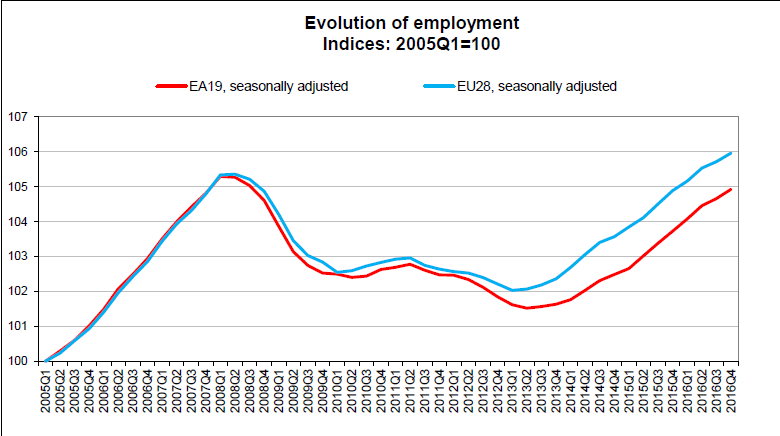Eurostat/Employment up by 0.3% in the euro area and by 0.2% in the EU28, 15 March The number of persons employed increased by 0.3% in the euro area (EA19) and by 0.2% in the EU28 in the fourth quarter of 2016 compared with the previous quarter, according to national accounts estimates published by Eurostat, the statistical office of the European Union. In the third quarter of 2016, employment increased by 0.2% …Read More
Industrial production up by 0.9% in euro area Up by 0.5% in EU28
Eurostat/Industrial production up by 0.9% in euro area Up by 0.5% in EU28, 14 March In January 2017 compared with December 2016, seasonally adjusted industrial production rose by 0.9% in the euro area (EA19) and by 0.5% in the EU28, according to estimates from Eurostat, the statistical office of the European Union. In December 2016 industrial production fell by 1.2% in the euro area and by 0.7% in the EU28. Relevant …Read More
Workers in 7 EU countries worse off today than 8 years ago
European Trade Union Institute and European Trade Union Confederation, (2017), “Workers in 7 EU countries worse off today than 8 years ago”, 13 March Workers are still not feeling economic recovery: wages are lower now than they were eight years ago in seven EU member states, according to new research published today by the European Trade Union Institute (ETUI) and European Trade Union Confederation (ETUC). The research also shows that in 18 …Read More
Spain: Maintain reform momentum to enhance economic recovery and boost inclusive growth
OECD, (2017), “Spain: Maintain reform momentum to enhance economic recovery and boost inclusive growth”, 14 March The Spanish economy is enjoying a robust recovery from a deep recession, with structural reforms contributing to high growth rates and a gradual decline in unemployment. However, further measures to promote innovative business investment and improve skills are needed to both boost productivity and ensure that the benefits of growth reach all Spaniards, according to …Read More
What happened to global banking after the crisis?
Schoenmaker, Dirk, (2017), “What happened to global banking after the crisis?”, Bruegel, 14 March The global financial crisis allegedly led to the end of global banking. However, we find that reports of the demise of global banking are premature. Among the global systemically important banks, we find that there has been a shift of business from the global European banks to the more domestic Asian banks, which are gradually increasing their …Read More
Democracy Over Sovereignty in Europe
Reichlin, Lucrezia, (2017), “Democracy Over Sovereignty in Europe”, Project Syndicate, 14 March The future of the European Union may not officially be on the ballot in the upcoming elections in the Netherlands, France, Germany, and Italy, but the results will go a long way towards determining Europe’s fate. Anti-EU sentiment is more widespread than ever, as demonstrated by the feverish campaigns of right-wing populist insurgents like Geert Wilders in the Netherlands and …Read More
Aftershocks of Monetary Unification : Hysteresis with a Financial Twist
Eichengreen, Barry J., Bayoumi, Tamim, (2017), “Aftershocks of Monetary Unification : Hysteresis with a Financial Twist”, IMF, 13 March Once upon a time, in the 1990s, it was widely agreed that neither Europe nor the United States was an optimum currency area, although moderating this concern was the finding that it was possible to distinguish a regional core and periphery (Bayoumi and Eichengreen, 1993). Revisiting these issues, we find that …Read More
The Case for Fiscal Policy to Support Structural Reforms
Banerji, Angana, Dabla-Norris, Era, Duval, Romain, Furceri, Davide, (2017), “The Case for Fiscal Policy to Support Structural Reforms”,IMF, 13 March Many advanced countries need structural reforms to make their economies more productive and raise long-term living standards. Our new research shows that provided countries can afford it, fiscal policy, through spending or tax incentives, can help governments overcome some obstacles to the reforms, particularly in the early stages. Structural reforms …Read More
Public Debt Sustainability Under Uncertainty : An Invariant Set Approach
Rozenov, Rossen, (2017), “Public Debt Sustainability Under Uncertainty : An Invariant Set Approach”, IMF Working Paper, 13 March The question of what level of public debt a country can afford is central to fiscal policy. Vast literature is devoted to debt sustainability and an array of tools has been developed to guide assessment. A comprehensive review of previous work on the subject is beyond the scope of this paper and …Read More
Europe’s Bailout Misery
Ashworth, Marcus, (2017), “Europe’s Bailout Misery”, Bloomberg Gadfly, 13 March Europe’s tale of two rescue funds is morphing into a worrying saga. The outlook for the region’s original crisis bailout vehicle, the European Financial Stability Fund, to raise sufficient long-term funds to do its job is getting trickier. Despite last week being a pretty decent one for bond issuance, the EFSF stayed on the sidelines. Meanwhile, its more-popular sister fund, the European Stability …Read More





